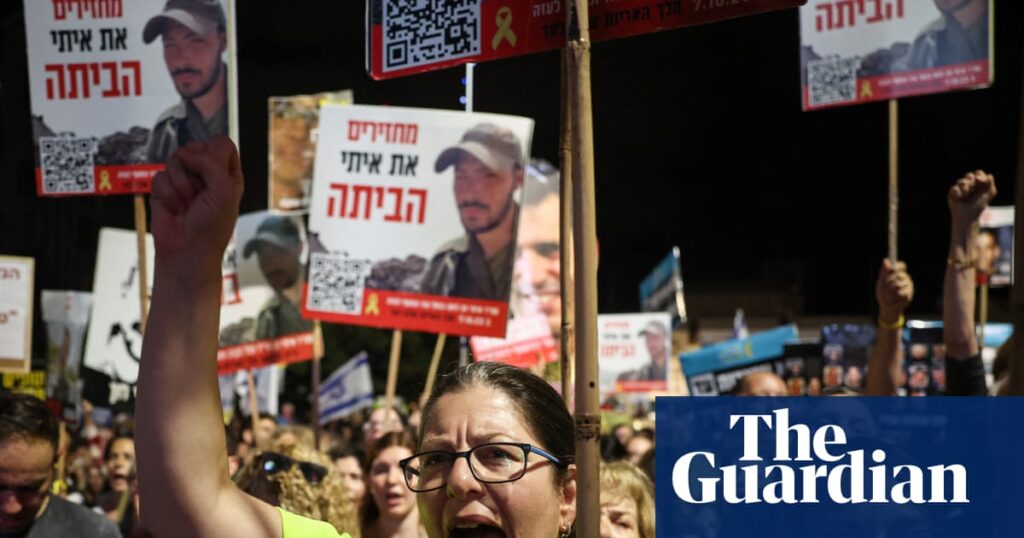Israel’s military has identified one of two dead hostages returned by Hamas, amid ongoing tensions over the Gaza ceasefire and a dispute over the reopening of the Rafah border crossing to allow in more aid.
The Israel Defense Forces (IDF) said early on Sunday it had told the family of hostage Ronen Engel that his remains had been returned. The 54-year-old was killed during the 7 October attacks at Nir Oz kibbutz and his body was taken into Gaza.
Engel was a photojournalist and volunteer ambulance driver for Magen David Adom. His death was confirmed in December 2023. His wife, Karina, and two daughters, Mika and Yuval, were also kidnapped but were returned during a deal in November 2023.
The office of Israeli prime minister Benjamin Netanyahu confirmed the return of Engel’s remains and reiterated its determination to secure the return of all hostages left in Gaza.
Engal was one of two dead hostages returned by Hamas on Saturday, with delays in finding bodies buried under the rubble of Gaza just one factor threatening the fragile ceasefire.
On Saturday night, the US state department said there were “credible reports” that Hamas would violate the ceasefire, saying a “planned attack against Palestinian civilians would constitute a direct and grave violation of the ceasefire agreement”. If such an attack took place, it said “measures will be taken to protect the people of Gaza and preserve the integrity of the ceasefire”.
On Sunday, Hamas rejected the US claim as false.
Israel has already accused Hamas of violating the ceasefire agreement by failing to return the remains of deceased hostages. On Monday, Hamas returned the last 20 surviving hostages but as of Saturday evening had handed back only 12 of 28 deceased captives, saying it would need specialist recovery equipment to retrieve the rest from the ruins of Gaza.
Gaza’s media office has also accused Israel of violating the ceasefire with Hamas 47 times since the truce came into effect in early October, killing 38 Palestinians and wounding another 143. It called on “the United Nations and the guarantor parties of the agreement to intervene urgently to compel the occupation to end its ongoing aggression and to protect unarmed civilian populations”.
On Saturday, Netanyahu’s office said the Rafah border crossing between Gaza and Egypt would stay closed “until further notice”, and that its reopening would depend on how Hamas fulfils its ceasefire role of returning the remains of all 28 dead hostages.
The Palestinian embassy in Cairo had said earlier the territory’s sole gateway to the outside world would reopen on Monday.
Hamas has urged mediators to increase the flow of humanitarian aid into Gaza for its 2 million people, amid continued closures of crossings and Israeli restrictions on aid groups. Aid remains critically scarce in Gaza one week into the ceasefire, humanitarian agencies have said.
The Rafah crossing is the only one that was not controlled by Israel before the war. It has been closed since May 2024, when Israel took control of the Gaza side. A fully reopened crossing would make it easier for Palestinians to seek medical treatment, travel or visit family in Egypt.
As part of the ceasefire agreement, Israel on Saturday returned 15 bodies of Palestinians to Gaza, bringing the total it has returned to 135. However, they have been returned with no names, only numbers. Gaza’s health ministry has been posting photos of them online, hoping families would come forward.
Meanwhile, Gaza’s ruins were being scoured for the dead. Newly recovered bodies brought the Palestinian death toll above 68,000, according to the health ministry. Thousands of people are still missing, according to the Red Cross.
Gaza’s civil defence agency estimates that the bodies of about 10,000 people are trapped under the debris and collapsed buildings. The task ahead of the rescuers is immense given that there is an estimated 60m tonnes of rubble across the territory.
With Associated Press and Agence France-Presse

